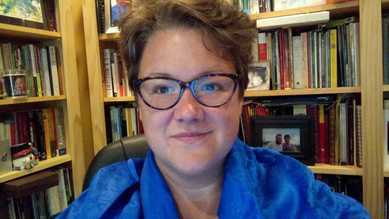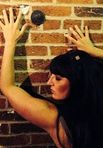Carpe Noctem Chapbook Interview With Camille-Yvette Welsch
 dancing girl press & studio, 2016 ,THINGS WE’RE DYING TO KNOW…
dancing girl press & studio, 2016 ,THINGS WE’RE DYING TO KNOW…Let’s start with the book’s title and your cover image. How did you choose each? And, if I asked you to describe or sum up your book, what three words immediately come to mind?
I've long admired Kristy Bowen’s book designs; it was one of the reasons I submitted to the press and I didn’t want to say some ridiculous idea and have it color her vision for the cover design. Instead, I asked if she had an idea and she came up with this, and I love it, the moonlight peeking through the wolf prints.
As for the title, I think that the idea of being full—full to bursting, stuffed—implies a certain discomfort, a border being suddenly met. In the course of the poems, the narrator longs for fullness of pantry, of well-being, of imagination, and as pregnancy takes over her body, that too becomes a fullness, and with each type of fullness, comes an insecurity. We have the stores, but how long will they last? My body is growing but is it too fast or slow? I have this house I ramble through, its protections and its people, but are they enough to keep me safe and whole? Are they too much? Will they keep me imprisoned?
Of course, on a literal level, the poems also speak to the full moons that have long marked the Native American calendar and revealed in their naming, what work is to be done, what nature has wrought.
What were you trying to achieve with your chapbook? Tell us about the world you were trying to create, and who lives in it.
When I first became pregnant, one of my great fears about parenting was the never-ending need of a baby. As the third out of four kids, I know quite well that parenting is work. It is also joy and fun and lots of other things, but it is still three meals a day, bathing, dressing, changing, cleaning, and all of these daily and consistent chores.
The summer that I wrote this my two children had grown a bit more independent and I could take some time to write. A friend was struggling to write about the moon cycle and had given up. I picked up the idea because it so resonated with what I had come to understand more intimately about family life: There was no end; there were simply cycles of work. Sometimes daily, sometimes seasonal, often called phases, and as a family, we moved through them, trying to set things by to sustain us, whether it was story time or snuggling, or whatever. The hard work of living together and raising each other bore fruit that would be savored in times of scarcitye, the luscious scent of clean baby, or the downy hair at the back of the neck, all the memories gleaming in their jars put up for when anger or frustration overwhelm us. In the book, I make sense of my conflating these two ideas.
The final thought that drove me is that with children, and with living off the land as people once did, each day thrums with some low-lying terror—a child should fall, be grabbed, get diagnosed, run away, have an allergic reaction, fall in love, fall out of love, be bullied, etc. Or, a crop should fail, there is blight, too much water, not enough water, mice eating through stores, a storm that takes down fruit trees, rabies, wild animals, livestock that takes ill, a rifle that doesn’t shoot, or shoots too well. The wolf that prowls outside the house becomes foe and id simultaneously for the speaker who has a hard time imagining a world outside the confines of the farmhouse while simultaneously recognizing that the freedoms of the wolf are also tightly dictated.
Can you describe your writing practice or process for this collection? Do you have a favorite revision strategy?
My writing process involves one key element: get myself alone. I don’t have a home office where I can go and simply close the door. My desk sits in the library/family room where all the books are and many of the kids’ toys. I can write with noise, but not with the kids around. Whatever world I enter internally, they are always the barbarians at the gate, demanding entrance, and that is actually fine. When I am with them, I like to be with them.
So, my process is to get out of Dodge, go to a coffee shop, and start messing around for about thirty minutes—read Facebook, read some other poets, check out some online journals I like—and then write. I will write pretty steadily for about an hour, then it is time to go back home or grade or whatever. When I get an idea, I acknowledge it and then let it marinate until I can find that alone time.
Revision is always an interesting question for me. I do a lot of drafting in my head and as I write. I think I would have more evidence of that if I wrote longhand. Since I write on the computer, I simply consider, delete, and reconsider without record, thus I suspect that I do more of it than I recognize.
How did you order the poems in the collection? Do you have a specific method for arranging your poems or is it sort of haphazard, like you lay the pages out on the floor and see what order you pick them back up in?
The poems follow the Native American interpretation of the full-moon cycle. The name of each full moon correlates to a specific reality of life in that moment—from the spring blossoms to the running salmon.
What do you love to find in a poem you read, or love to craft into a poem you’re writing?
I just want to be surprised—by language or image or idea. I read Cynthia Marie Hoffman’s The Paper Doll Fetus and the use of history and the strange perspectives were so startling and yet they felt so true and right that I just adored that book. I want that kind of immersion and awe in my reading.
Can you share an excerpt from your book? And tell us why you chose this poem for us to read – did it galvanize the writing of the rest of the collection? Is it your book’s heart? Is it the first or last poem you wrote for the book?
This poem appears in the middle, but it gives a sense of some of the issues I was talking about earlier—the perceived freedom of the wolf, the never-ending responsibilities of household, etc.
Full Flower Moon
We are correspondents now,
like a game of telephone you cry
down from the mountain and I fill
in the silence with words. Here, I bend
over fields of strawberries, picking
and plucking, gathering enough
for pies and jam, to keep the taste
of summer in our mouths long after
the days have shortened. Red combats
darkness, a color war I knew little about
until winter came. I imagine your legs
stretching, eating the land. Sometimes
I dream of you and I, your scent
close in my face as we run, and each bite
I take is about this moment. I move across
fields, taking as I find it, thinking only
of this sharp taste, that tangy scent, never
of the gaping vortex of the cellars, the pantry,
the shelves ordered and waiting, a reminder
that everything must end.
I’ve heard poets say that they’re writing the same story over and over in their poems. Is that true for you?
As I don’t really write autobiographical stuff as much as I write persona poems, I don’t think that is quite as true. I am not working over the same knot of personal history. Of course, in every poem, unavoidably, I appear as thinker and perceiver on some level, and certainly, living as a woman in the United States, a lot of my concerns about feminism and how women are perceived and how we perceive ourselves, pervade my writing.
Do you think poets have a responsibility as artists to respond to what’s happening in the world, and put that message out there? Does your work address social issues?
I am not sure how you can avoid this. Writers are writing from a moment in time, and their mores are either in accordance or in conflict with that time. I think that tension makes its way to the page regardless. Some, of course, are more overt, but I think all stories have a kind of politics of perception to them. I am no different.
In my larger manuscript, which will hopefully find a home soon, I am looking at the Western beauty aesthetic through the eyes of the four ugliest children in Christendom. The story’s heart is the kids, not a political idea, but there is still a lot of commentary on beauty and ugliness, religion, adoption, academia, and so on.
Are there other types of writing (dictionaries, romance novels, comics, science textbooks, etc.) that help you to write poetry?
Everything helps. Once you learn a shape, you can fill it. These are all shapes, and they keep you limber and ready for action. There is a great memoir by Randon Billings Noble where she usesthe information that accompanies a prescription. I use that piece to teach my students, but also to remind myself to be open. Recipes become list poems, and anthropology books became the basis for the specimen reports in The Four Ugliest Children in Christendom, the manuscript I referenced earlier.
What are you working on now?
Assorted poems. I have been caught by the new room found in the Sarah Winchester house. I have no idea if anything will come of that. I did a 30/30 with ELJ Publications and used my mother’s 1952 Girl Scout Handbook as source material for all of the poems. That was a lot of fun. Now I have to figure out how to revise found poems.
Without stopping to think, write a list of five poets whose work you would tattoo on your body, or at least write in permanent marker on your clothing, to take with you at all times.
Louise Gluck, Sharon Olds, Paula Meehan (though I would weep), Richard Hugo,
Lyn Emmanuel, Philip Levine. Okay, so that was six, but I love the list!
**
Purchase Full from dancing girl press & studio.
 Camille-Yvette Welsch is the author of Full, a chapbook released with dancing girl press. She teaches at Penn State where she earned her MFA. She serves as book reviews editor for Literary Mama and her work has appeared in or is forthcoming in Menacing Hedge, Indiana Review, The Writer’s Chronicle, Atticus Review, Radar Poetry, Mid-American Review, Split Lip, and From the Fishouse, among other venues. Her manuscript, The Four Ugliest Children in Christendom, was a finalist for The Washington Prize, and her poem, "The Four Ugliest Children in Christendom Go to Cirque du Soleil," was nominated for a Pushcart Prize in 2016.
Camille-Yvette Welsch is the author of Full, a chapbook released with dancing girl press. She teaches at Penn State where she earned her MFA. She serves as book reviews editor for Literary Mama and her work has appeared in or is forthcoming in Menacing Hedge, Indiana Review, The Writer’s Chronicle, Atticus Review, Radar Poetry, Mid-American Review, Split Lip, and From the Fishouse, among other venues. Her manuscript, The Four Ugliest Children in Christendom, was a finalist for The Washington Prize, and her poem, "The Four Ugliest Children in Christendom Go to Cirque du Soleil," was nominated for a Pushcart Prize in 2016.
Published on December 20, 2016 13:13
No comments have been added yet.



